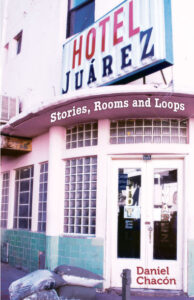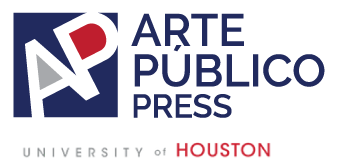 Chacón chosen as May 2013’s “Author of the Month” on Houston Public Media
Chacón chosen as May 2013’s “Author of the Month” on Houston Public Media
Houston Public Media radio host Eric Ladau interviewed Chacón for its website’s “Arte Público Press Author of the Month” feature, and along with the transcript, their conversation is available to listeners on the station’s interactive site through on-demand audio streaming here.
Click here to see all Arte Público authors featured on Houston Public Media.
About the Author:
DANIEL CHACÓN is the author of Unending Rooms (Black Lawrence Press, 2008), winner of the Hudson Prize; and the shadows took him (Washington Square Press, 2005) and Chicano Chicanery (Arte Público Press, 2000). His fiction has appeared in the anthologies Lengua Fresca: Latinos Writing on the Edge (Mariner Books, 2006), Caliente: The Best Erotic Writing in Latin American Fiction (Berkley Trade, 2002) and Best of the West 2009: New Stories from the West Side of the Missouri (University of Texas Press, 2009). He is co-editor of The Last Supper of Chicano Heroes: The Selected Works of José Antonio Burciaga (University of Arizona Press, 2008).
About his latest book, Hotel Juárez: Stories, Rooms and Loops
 In this collection of short and flash fiction, Daniel Chacón examines peoples’ interactions with each other, the impact of identity and the importance of literature, art, and music. In one story, a girl remembers her father, who taught her to love books and libraries. “A book can whisper at you, call at you from the shelves. Sometimes a book can find you. Seek you out and ask you to come and play,” he told her. Years later, she finds herself pulling an assortment from the shelves, randomly reading passages from different books and entering into the landscapes as if each book were a wormhole. Somehow one excerpt seems to be a continuation of another, connecting in the way that birds do when they fly from a tree to the roof of a house, making “an idea, a connection, a tree-house.”
In this collection of short and flash fiction, Daniel Chacón examines peoples’ interactions with each other, the impact of identity and the importance of literature, art, and music. In one story, a girl remembers her father, who taught her to love books and libraries. “A book can whisper at you, call at you from the shelves. Sometimes a book can find you. Seek you out and ask you to come and play,” he told her. Years later, she finds herself pulling an assortment from the shelves, randomly reading passages from different books and entering into the landscapes as if each book were a wormhole. Somehow one excerpt seems to be a continuation of another, connecting in the way that birds do when they fly from a tree to the roof of a house, making “an idea, a connection, a tree-house.”
Misconceptions about people, the responsibility of the artist and conflicts about identity pepper these stories that take place in the U.S. and abroad. In “Mais, Je Suis Chicano,” a Mexican American living in Paris identifies himself as Chicano, rather than American. “It’s not my fault I was born on the U.S. side of the border,” he tells a French Moroccan woman when she discovers that he really is American, a word she says “as if it could be replaced with murderer or child molester.”
Many of the stories are very short and contain images that flash in the reader’s mind, loopback and connect to earlier ones. Other stories are longer, like rooms, into which Chacón invites the reader to enter, look around and hang out. And some are more traditional. But whether short or long, conventional or experimental, the people in these pieces confront issues of imagination and self. In “Sábado Gigante,” a young boy who is “as big as a gorilla” must face his best friend’s disappointment that—in spite of his size—he’s a terrible athlete, and even more confounding, he prefers playing dolls to baseball. Whether in Paris or Ciudad Juárez, Chacón reveals his characters at their most vulnerable in these powerful and rewarding stories, anti-stories and loops.





